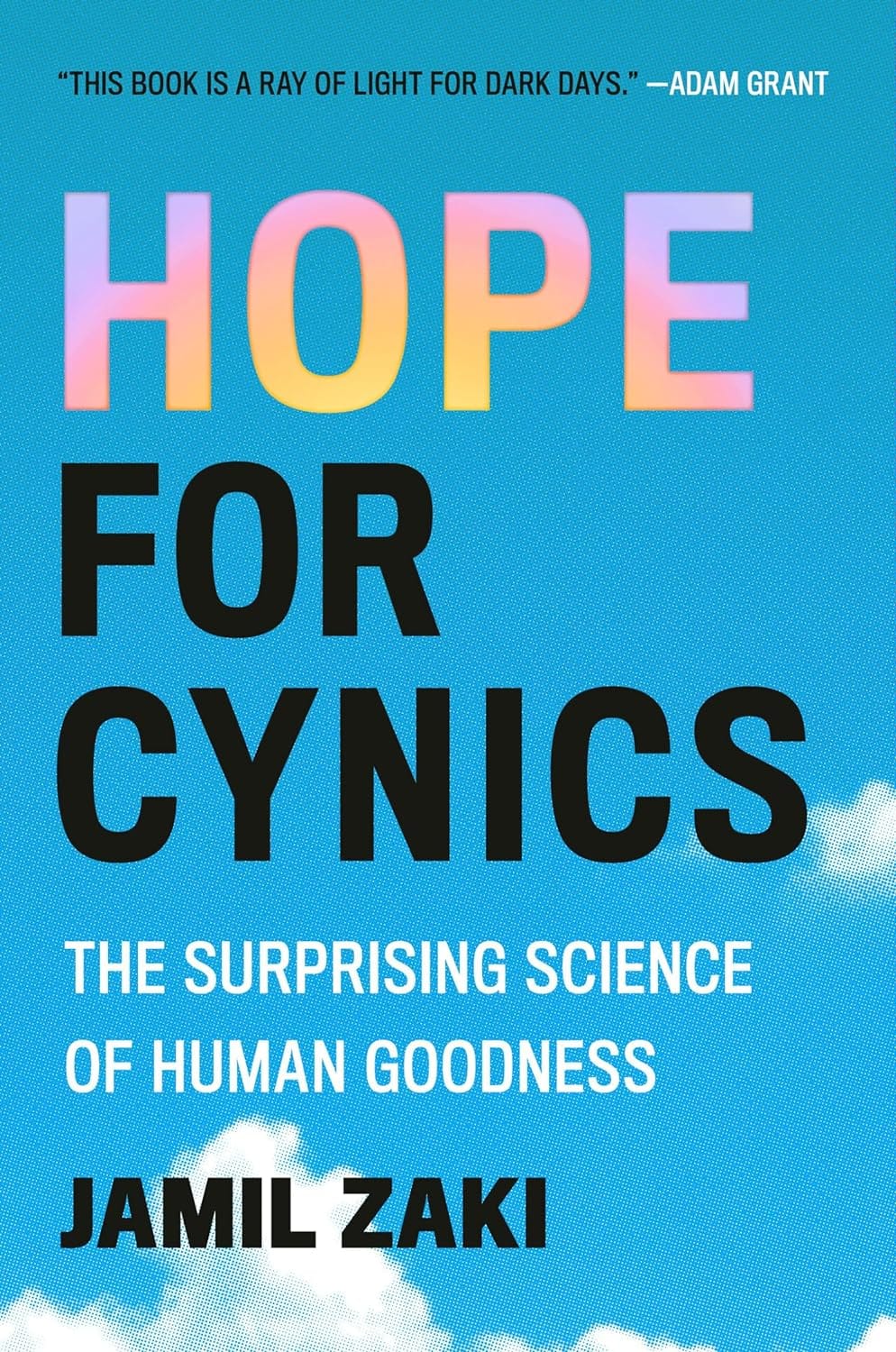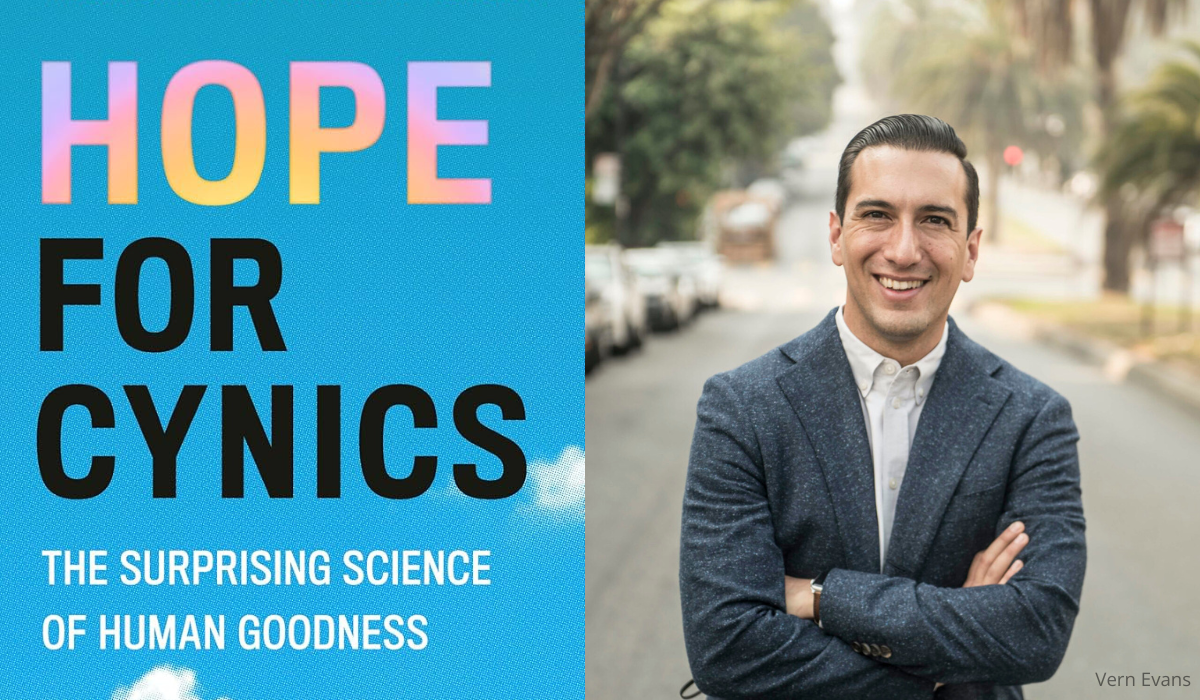Stanford Psychologist Jamil Zaki Says There’s a Difference between Hope and Optimism—and We Need One Now More than Ever
So many of us are experiencing some level of fear, cynicism, even despair right now. This past week alone, with jolting news and evolving narratives, has maxed our capacity for uncertainty. When we need connection and warmth more than ever, we're veering further away from one another. It is, as Stanford psychologist Jamil Zaki, Ph.D. says, the most cynical time since experts have been measuring cynicism over the last 70 years.
That's a tough pill to swallow—but Zaki brings in the light. His work is compelling, as it tells us as much about how cynicism is interfering with our lives as it does about how we can move through it and see the goodness in each other, even when it may feel emotionally unsafe to do so. We spoke with Zaki, whose new book Hope for Cynics comes out in September, about how we can restore our ability to move forward with more compassion and truth.
A CONVERSATION WITH JAMIL ZAKI, PhD
Considering both the grand context and this messy moment we're in right now, things are wild. Many people are experiencing cynicism, confusion, and even despair. What concerns you, and what is top of mind for you right now?
As a person, I feel what you're describing. Just because I write about hope and deconstructing cynicism doesn't mean I'm better at it than anybody else. I have felt so much hopelessness and, really, concern. It's very easy during stressful, painful, tragic times for our consciousness to kind of shrink. It's easy to lose the sense of possibility and focus on the many things going wrong as the only way things can unfold in the future.
One thing that I keep on coming back to is how critical it is to remember the difference between hope and optimism. Optimism is the idea that things will turn out well. Hope is the idea that it could turn out well. I know that sounds like a minor distinction, but I think it's huge. I, in no way, feel optimistic right now. So many things seem like they're trending in a tough direction. But I can hold on to hope. Hope is an attempt to see that the future is unknown. Optimism, despair, and hopelessness all make us feel like the future is inevitable and, therefore, our actions don't matter. Hope can lead us to feel empowered. So, that's what I'm reaching for right now: to remember our uncertainty and that in that uncertainty lies possibility and agency.
In your forthcoming book, Hope for Cynics, you explore how hopeful skepticism can be a tool for overcoming cynicism and helping people see the goodness in one another. What is hopeful skepticism, and how can we use it?
Again, that distinction is really important. I separate cynicism, which is the assumption that most people are selfish, greedy, and dishonest, from skepticism, which is not putting on rose-colored glasses or being naïve, but rather, it is simply being open to information, including information about the social world. Skepticism is not rushing to judgment but thinking like a scientist and asking yourself, What evidence do I have to make conclusions? It turns out that when we turn to skepticism over cynicism, we realize most people are better than we think.
Again, I am not saying that you must trust every politician or person. But when we think about what the average person is like, especially based on the media we consume in our culture, we're actually not thinking about the average person, but rather we're thinking about extreme, toxic people in our environment. We may pay attention to the bully in middle school or that one toxic colleague at work, and we can confuse these folks with the average person when they're not. In fact, I include decades' worth of evidence in my book that shows we underestimate how trustworthy, generous, friendly, and compassionate the average person is. The average person underestimates the average person.
When I talk about hopeful skepticism, all I mean is combining a scientific mindset with the understanding that our minds and our media can lead us to negativity and, rather, understanding that when we open up and pay close attention not to our imagination or assumptions but to who is really out there, pleasant surprises are everywhere. When we think scientifically, we will see all the good already in people.
What if we feel petrified right now? Let's say we are wallowing in fear, worried about speaking from our hearts, or simply spinning over the world. What step can we take that will lead us toward hope right now?
I'll give you two steps! First, again, I really want people not to be naive and gullible. I want people to be data-driven. What I walk through in the book is that so many of us are scared of having open and brave conversations, but the data are really clear: we are too scared. I call these social shark attacks. You know how shark attacks are extraordinarily rare, but they're so vivid that a lot of people are scared to go in the ocean for no good reason, just because it's so scary. Likewise, we think that if we try to talk to strangers, they'll ignore us. If I tell my friends my opinion, they'll judge me. While there are certainly cases in which that happens, they turn out to be enormously rare. You find that when people have deep conversations, their conversations are uplifting, less awkward, and more connected. This includes conversations where people confide their struggles in others when they ask for help, express gratitude, and even express a disagreement about political opinion. So, the first step is to realize that your fears are natural, but we might be de-risking ourselves too much. For fear of a rare outcome, we might be losing out on chances for real connection. That mindset shift is the beginning.
The second step is to act on that mindset by doing what I call taking small leaps of faith in other people. This doesn't have to mean coming out with your most controversial opinion on an all-company Slack channel. But rather, think about small ways you can take a chance on somebody in your life. Then, try to take note of what you fear and compare that to what's really happening. Because if you're like most people in most situations, you will be pleasantly surprised.

Jamil Zaki is a professor of psychology at Stanford University and the Director of the Stanford Social Neuroscience Lab, as well as an author. He trained at Columbia and Harvard, studying empathy and kindness in the human brain. He is interested in how we can learn to connect better. Learn more about his work here.
Please note that we may receive affiliate commissions from the sales of linked products.



